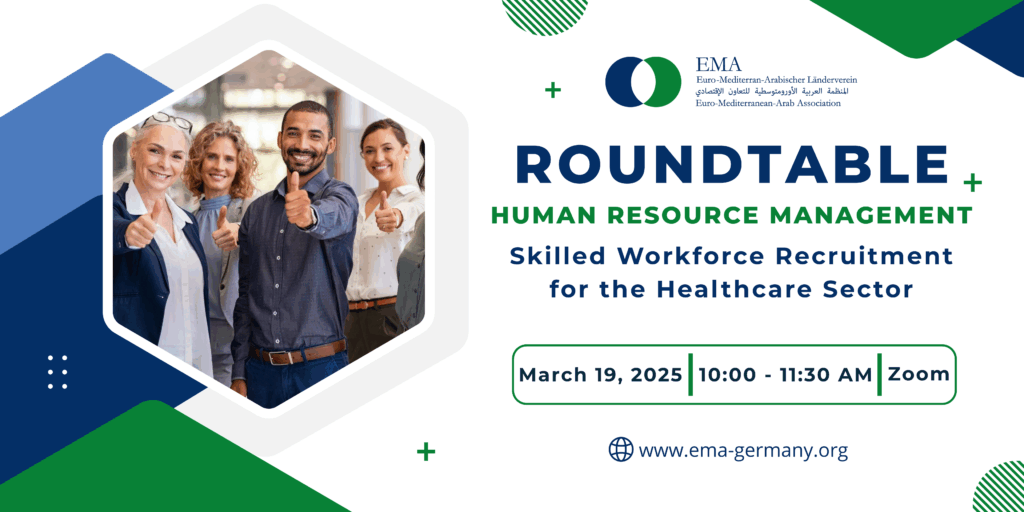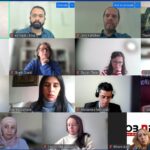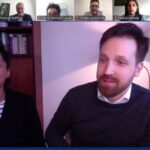
Organized by

Recruiting young professionals and trainees from the Southern Mediterranean countries of origin such as Egypt, Jordan, and Morocco for the German labor market is an important initiative that has yet to realize its full potential.
The EMA supports this initiative and invites you to actively participate and engage with us in a dialogue on human resource management and talent acquisition in the German-Arab context. Take the opportunity to join our upcoming event and share your perspectives and needs with us:
Online Roundtable on Human Resource Management
Talent Acquisition for the Healthcare Sector
Online (via Zoom) | 19 March 2025 | 10:00–11:30 AM
Language of the event: German
Impressions from the Online Roundtable “Skilled Workers in Healthcare – Shaping Partnerships”
With around 35 participants, the online roundtable on international recruitment of healthcare professionals, organized by the EMA, attracted great interest. The central focus was on how to successfully recruit and sustainably integrate nursing staff from North Africa and the Middle East—and the role that reliable partnerships play in this process.
Insights from EMA and Invitation to Dialogue
Dr. Thomas Wülfing, President of the EMA, opened the event with a clear appeal: the shortage of skilled workers in the healthcare sector is one of the biggest challenges Germany is currently facing. For him, a particular impetus came from a German ambassador’s reference to the potential of qualified nurses in Tunisia, which led him to engage intensively with the topic. It quickly became clear how complex and challenging the issue is. Close exchange in this area is therefore crucial in order to tackle the complex challenges together.
Recognizing Challenges – Creating Structures
The valuable contributions from the speakers quickly made it clear: recruiting nursing professionals from abroad is complex. The recognition of qualifications, required language proficiency, cultural differences, bureaucratic procedures, and the search for housing in urban areas all pose significant challenges—for applicants as well as for German institutions. Participants agreed: without targeted management, reputable recruitment structures, and trustworthy partnerships on both sides, the potential remains untapped.
Best Practice: Reliable Recruitment from Morocco
Tobias Lamprecht and Fatima Salhane from Mordik shared insights from their joint work recruiting Moroccan nurses. Their approach: a holistic program with language preparation by German teachers, transparent contract design, cultural orientation, and close support throughout the visa and integration process. More than 100 applicants have joined the program since October 2024—a sign that structured approaches are effective. Salane emphasized: anyone making the journey to Germany needs realistic expectations and good preparation—on both sides.
Sustainable Integration through Targeted Support
Another contribution came from Sören Faika, Managing Director of DIBeratung GmbH, who specializes in supporting international nurses. He stressed that successful integration requires more than language skills and qualifications: structured alignment of expectations between employers and applicants is crucial for long-term satisfaction. Particularly important are cultural preparation, technical language courses, and professional support for integration from the moment of arrival—in terms of language, culture, and professional skills.
Jordan as an Underrated Partner
Yasmin Shabani, Vice President of the German-Jordanian Society and founder of Avicenna Personal, brought her dual perspective as a bridge-builder between Jordan and Germany. She presented Jordan as a country of origin with remarkable potential: a young, well-educated population with German and English skills meets a state interest in qualified migration. Her appeal: Jordan is often underestimated but is a “hidden gem.”
Ms. Shabani pointed to existing programs, such as the GIZ Mobility Project or collaborations with the Central Association of German Crafts, which are already creating viable structures. Success factors include targeted recruitment, language support, cultural preparation, and individual guidance—combined with active recruitment rather than passive job postings.
Thanks and Open Discussion
Dr. Thomas Wülfing thanked the speakers for their valuable contributions and opened the closing round with the question: How do German employers experience the integration of international nurses—and how can possible reservations be reduced?
Recognizing Reservations – Building Trust
Tobias Lamprecht reported initial uncertainties in some clinics, especially towards applicants from Arab countries. However, personal encounters and integration training helped build trust and overcome barriers.
Mr. Faika emphasized that good integration does not depend solely on the professionals. What matters is active, structured onboarding by the institutions. Low-threshold formats such as short digital conversations are particularly helpful for getting started.
Everyday Challenges
Discrimination in the housing market due to foreign names was also discussed as a hurdle. Supportive structures and continuous guidance therefore remain crucial.
Conclusion and Outlook
In conclusion, Dr. Thomas Wülfing emphasized that the entire process is complex and that the recruitment of skilled workers does not end with their arrival in Germany, but requires long-term support and integration—both for the newcomers and the receiving institutions.
He expressly thanked the speakers for their well-founded contributions and valuable work, which form a central foundation for the future viability of the German healthcare system. The EMA will continue to drive forward the topic of skilled worker recruitment and establish it as a strategic priority in other areas as well.





